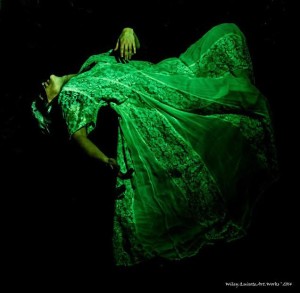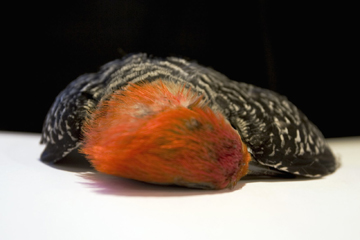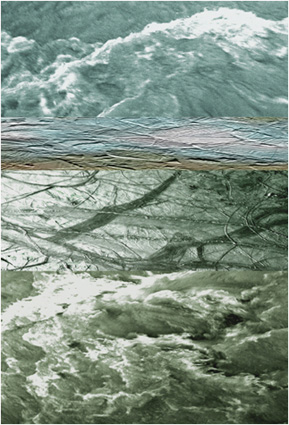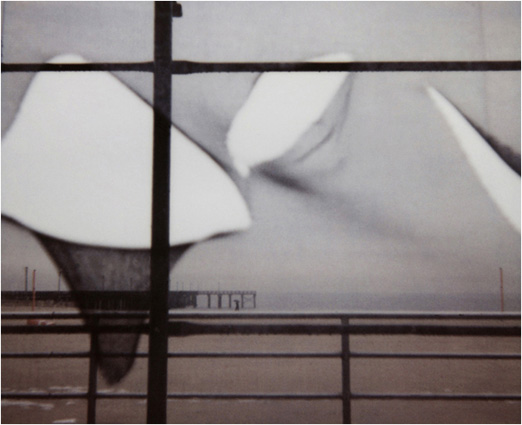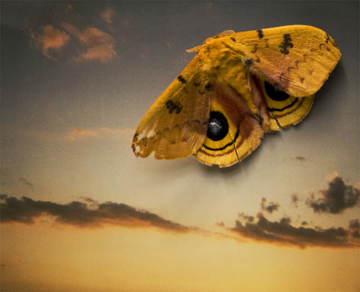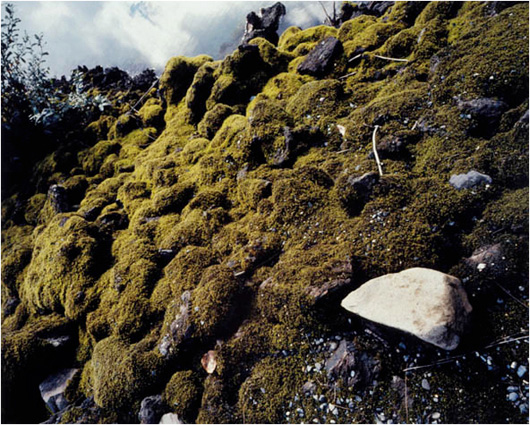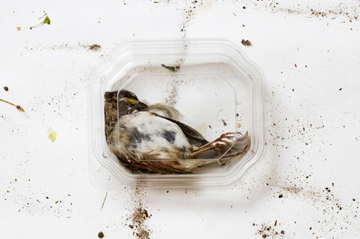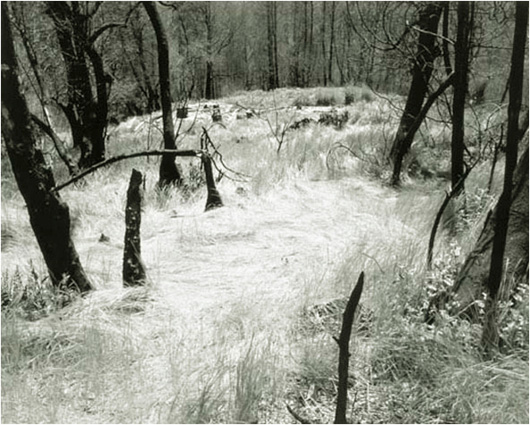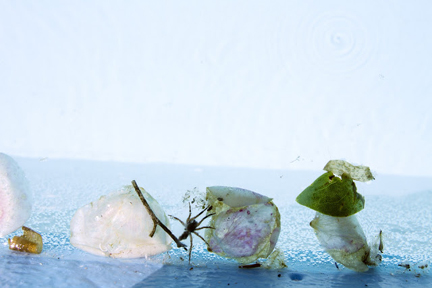
Row of Petals, image by Karen Bell
As usual, you’re late. You take the wooden stairs two at a time, round the landing, and stop in front of the director’s office, where you gulp air and try to look confident. (It doesn’t work.) Then you knock. Nobody answers. You dither in the hallway for a second, then decide to wait for her.
Once your eyes have adjusted, the office is frighteningly venerable. Shelves and shelves of voluptuous bottles glow in the afternoon sunlight, all shining with their own importance. The empty Jim Beam black label might have come from the grocery store down the street, and there’s even a whole row of PBR cans, which is surprising, it’s so mass-appeal and pulpy. But then there are the true exotics that let you know you’re in the Workshop director’s office: emerald-green absinthe bottles with necks like lamps. A diamond-shaped blue flask, almost knee high. A series of tiny bottles that look like they should hold perfume. All of them beautiful rarities, and all of them expect something of you.
You sit down at the long wooden table, run your index finger around one of the many beverage rings. It occurs to you that hundreds of people have sat here before and many of them have never been successful. You’re very late. It seems impossible that she could be this late too. You are just starting to really panic when something thunks against the door. When you open it for her, she blinks in surprise, then says, “Hello! I almost forgot we were meeting!”
It’s still really strange to see her in person, but today, she looks nothing like her black and white photos. Her arms are packed with what’s got to be student work: cans clank in an empty 30-rack of Rolling Rock, and a 40 of malt liquor is tucked under her elbow. She lets all of it tumble in a pile next to her desk, then opens a drawer and pulls out a fifth of Absolut. The Director pours four fingers into a glass, adds ice, then tops it off with a splash of kiwi juice and some strawberry-flavored Sobe water from the little refrigerator. It’s an innovative, gorgeous combination, and frankly you are filled with jealousy.
“Just got to finish this up for this afternoon,” she says. “Deadlines, you know?” and she rolls her eyes conspiratorially.
You thank her for seeing you. “I’m having trouble.”
“Mm-hmm,” she says, sitting down behind the desk, neither confirming nor denying what she knows. And so, for the first time, you start to talk about your problem.
“Sometimes I set out to, you know, start early. The way the really successful people do it.”
The director raises her eyebrows. She has pulled a square of knitting out of her bag, but somehow it’s not stopping her from sipping at her cocktail.
You forge on. “You know – you know how it goes, right? You just get in the store right when it opens, pick up bourbon or rye or whatever. At first it’s great, it’s going like gangbusters. You just sip away at it, little by little, just like the manuals tell you to.” You point at the empty Bulleit Bourbon on her shelf. “Last workshop, right, I thought I’d finish one of those. Just something real classic, mixed with a little coke, over ice, in a nice glass, savored on my porch. I’ve got a great porch.”
“Aren’t porches nice?” she murmurs, rounding a row.
“But you can’t drink all the time. You’ve got to take a break. There’s sort of a digestive process in which you set it aside, give the old stomach a rest, mull it over….” You sound like you do when you’re teaching. She nods.
“Me, though?” You gulp, and your stomach starts to churn like it did around 4 am last night, when you knew you had to see her. ”This keeps happening. Every time I’m up. Like, I buy the thing, but I get a few sips in, barely a dent, and I – I just become convinced it’s all wrong.”
“Huh,” she says.
“I think, like, this isn’t what I’m meant to be drinking. It’s not me. And I just get disgusted with myself, and so I start out on some other project. Beer mixed with lemonade in Hickory Hill Park, say. Or… six Long Island Iced Teas at the gay bar, washed down by Jack and Coke. Or something exotic, really exotic…”
She finishes the sentence. “Absinthe, or something.”
“Yeah, like absinthe.” Or something. “So – so I start off on all of these projects, and then sooner than I realize workshop is coming up, and I panic, because though I’ve, you know, started a lot,” you’re exaggerating, “I’ve finished nothing. Sure, I’ve gone to Prairie Lights a few times, just to be seen drinking, but what do I really get done there? Just a Houndstooth or two…” The truth is, it’s getting oppressive on your porch. The open bourbon bottles are gathering dust, and the red wine is filled with odd chunky flakes. “The morning I’m due, I panic. I open the same bottle of bourbon I started with, and just resolve to really do it right this time.”
She sighs, understanding. “And then you have to finish the whole thing, and you’re too wobbly to get down to Rye House, and your friend has to pick you up.”
“Literally.” Has she been watching you? “This isn’t how it’s supposed to work, I think. And once I get there, here’s the worst part, I think it’s all gone, I’ve done what I needed to do, but once we’re sitting around the table, I look at the bottle in my hand and it’s, like, two-thirds of the way there. It’s not even finished, and I can’t even sit up straight. All the while there’s Ethanol Grainin sitting across from me, two bottles in and he’s fine, he drank them on the treadmill this morning for God’s sake…” You breathe.
Sam Changover nods. She bites her lip, then lifts the knitting from her lap. Somehow, while you’ve been talking, she’s knitted an entire baby sweater. Then she looks at you, and she says, “Have you heard of Arthur Pullock?”
Politely, you say, “What?”
“Arthur Pullock,” she says again.
It’s like that time her agent asked you which drinkers you most modeled yourself after, and it was like your mind had nothing in it. You just opened and closed your mouth for a minute and then what came out was “Amy Winehouse” and the agent laughed and said “Sure, if the singing hadn’t gotten to her…”
Finally you say, “Nope.”
“Well.” She finishes the cocktail, then pours another. “Not many have. But I think you should really look into his work. You’re from Minnesota, right?”
“Er, Wisconsin, yeah…”
“Well, Pullock was Minnesotan, and your stuff kind of reminds me of him. He did a really interesting body of work with bourbon in the fifties. Look him up – he just, he drank in a lot of fascinating places,” and she spins for you a narrative of Pullock’s ability to swig bourbon in the bath, while plowing, while copulating, to stay out in bars til half past three even though the town was a dry town and the speakeasy closed at ten. “He was just– so forceful with his habits. Of course, you’re young, I’m not expecting you to…”
“To be a Winehouse,” you say. “Or a Churchill.”
“Of course not – you’re young. But really: look into Pullock. And we’ve got a lot of cool drinkers coming into town for the festival, maybe you’ll find a role model there.”
You breathe, because she’s not quite getting your problem. It’s not like you need more inspiration. You’ve been to John’s, you’ve seen the wall of possible drinks – the problem isn’t drinking them, it’s finishing them. And the worst are the times when it just all becomes too much and you pull out a notebook – then, when you look at the clock, it’s five a.m. and you have a drunk due at noon the next day and you don’t even care.
“Can I borrow a beer?” you say. “Sorry, I just want to get something down.”
“Of course,” she says, and she rummages around and hands you a cold PBR.
You click it open and take a swig. And sure, it feels right, the way it did when you were just a kid, sitting in your mom’s garage, but it doesn’t come as easy as – as other things. “Professor Changover, can I be honest with you? I’ve got – I mean, I think I’ve got – a writing problem.”
She furrows her brow.
“I mean, I don’t think this is insurmountable, not at all,” you assure her. “I was born to drink. It runs in my family, my mom could’ve gone pro if she hadn’t had to support us.”
“Of course. You’re in at the Iowa Drinking Workshop,” she murmurs. “Best program in the country.”
“Yeah! And I know a lot of famous drinkers have writing problems. I mean, I saw the series downtown last year, and half of them were just reading through all of it. One guy got so excited I didn’t see him pick up his gin-and-tonic once in the second half, he was that into reciting some epic poem.”
“Hm,” and she sips carefully around the little umbrella. “Well, they do seem to go together, writing and drinking.” But you know she’s never had a problem with it. Maybe she’s thinking of the really successful drunks in your program – the ones who maybe, like, write a page or two in the company of others, but then they go on home, finish their twelve-pack for workshop, then start a bottle of wine, two. Just as a side project.
“I’ve got to confess,” you say, your throat gulping, “that it’s bigger than that.”
She looks up.
“See… I spent… just a lot, a lot of my stipend this year on it.”
“Mmm.”
“I know. I got the Mel Gibson fellowship and that meant you expected so much of me, and really it’s just weighing on me, how badly I’ve disappointed you. But what am I supposed to do, left alone with two thousand extra dollars?” You croak, “I spent it on a… a really nice desktop.”
It’s waiting at home. It’s got an extra monitor, even. You are such a hedonist. You wait for her to fire you.
“Look.” Sam Changover places a hand on yours. It’s cold from the drink. She says, “If you’re serious about drinking, well, it will find a way. But there’s only so much we can do for you, you know? When it comes down to it, the only person swallowing those quirky little cocktails is you.”
“Silly derivative fluff,” you choke.
She smiles. “Look up Pullock. Sometimes you’ve just got to drink through the derivative stuff in order to get to what you’re really meant to do.”
Though you’re swallowing beer over the lump in your throat, you cannot help but feel inspired. You suppose she’s the Drinking Workshop director for a reason.
“Well,” you say, your voice quavering, “at least I’m not turning in the crap my students do. The other day, I had a girl show up for workshop with, like, four half-drunk cans of Miller Lite. Can you beat that?”
“Sometimes you teach them, and sometimes they teach you,” she says, unraveling the sweater and starting over again even though it looked great the first time.
Jessie Hennen recently received her MFA in fiction (and other subjects) from the Iowa Writers’ Workshop. Before her time at Iowa, she worked in Munich, Germany, first as a nanny and then as a marketing project manager. Her work has or will appear on The Millions.com, in Untoward Magazine, Fiction365 and the Minneapolis Star Tribune. She is currently at work on “Flight,” her first novel.

